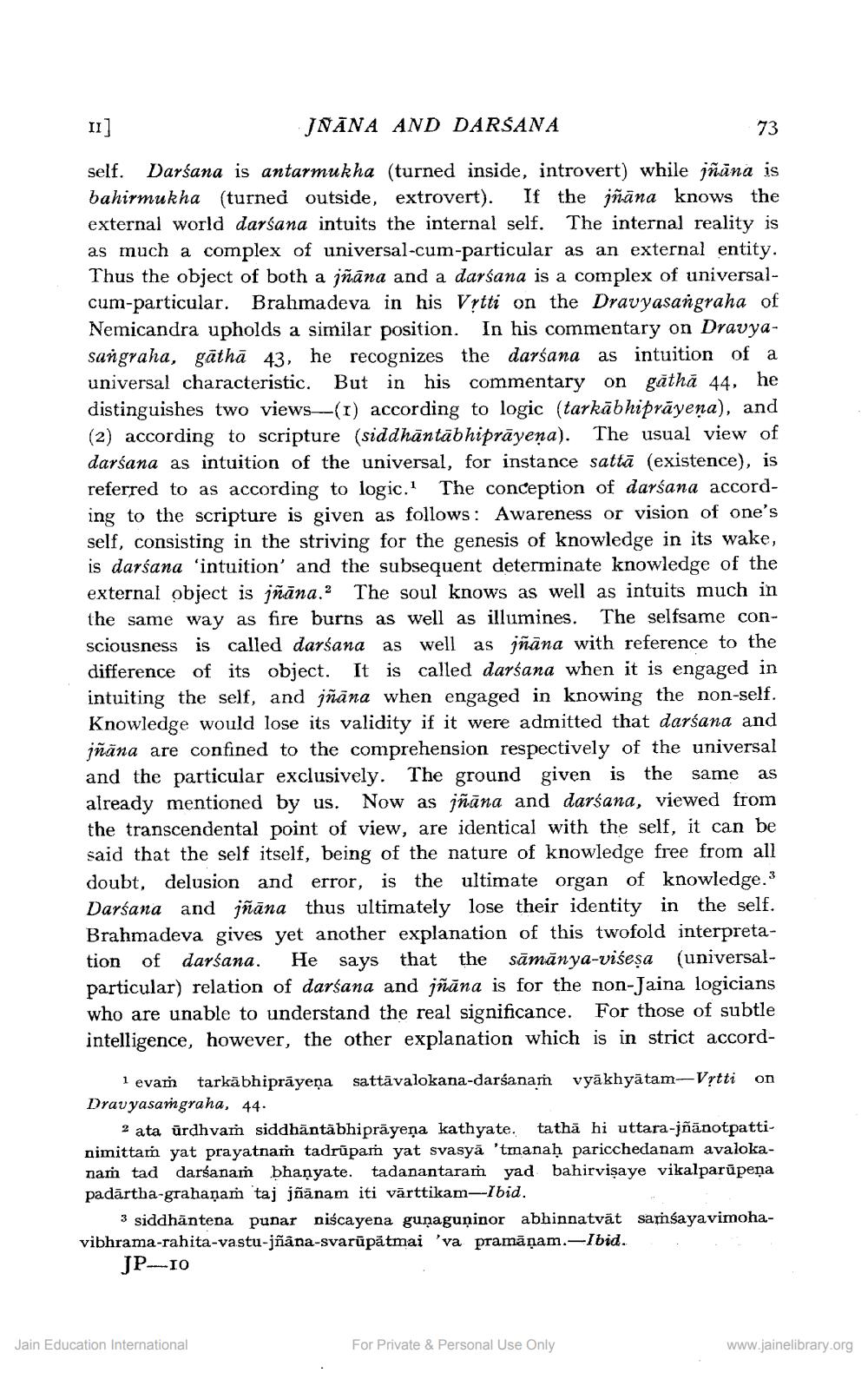________________
11]
JNĀNA AND DARSANA
73
self. Darśana is antarmukha (turned inside, introvert) while jñāna is bahirmukha (turned outside, extrovert). If the jñāna knows the external world darśana intuits the internal self. The internal reality is as much a complex of universal-cum-particular as an external entity. Thus the object of both a jñāna and a darśana is a complex of universalcum-particular. Brahmadeva in his Vytti on the Dravyasangraha of Nemicandra upholds a similar position. In his commentary on Dravyasangraha, gāthā 43, he recognizes the darśana as intuition of a universal characteristic. But in his commentary on găthā 44, he distinguishes two views_(I) according to logic (tarkābhiprāyena), and (2) according to scripture (siddhāntābhiprāyena). The usual view of darśana as intuition of the universal, for instance sattā (existence), is referred to as according to logic. The conception of darśana according to the scripture is given as follows: Awareness or vision of one's self, consisting in the striving for the genesis of knowledge in its wake, is darśana 'intuition' and the subsequent determinate knowledge of the external object is jñāna.? The soul knows as well as intuits much in the same way as fire burns as well as illumines. The selfsame consciousness is called darśana as well as jñāna with reference to the difference of its object. It is called darśana when it is engaged in intuiting the self, and jñāna when engaged in knowing the non-self. Knowledge would lose its validity if it were admitted that darśana and jñāna are confined to the comprehension respectively of the universal and the particular exclusively. The ground given is the same as already mentioned by us. Now as jñāna and darśana, viewed from the transcendental point of view, are identical with the self, it can be
aid that the self itself, being of the nature of knowledge free from all doubt, delusion and error, is the ultimate organ of knowledge.3 Darśana and jñāna thus ultimately lose their identity in the self. Brahmadeva gives yet another explanation of this twofold interpretation of darśana. He says that the sāmānya-viśesa (universalparticular) relation of darśana and jñāna is for the non-Jaina logicians who are unable to understand the real significance. For those of subtle intelligence, however, the other explanation which is in strict accord
1 evan tarkabhiprāyeņa sattävalokana-darśanam vyākhyātam-Vytti on Dravyasamgraha, 44.
2 ata urdhvar siddhäntäbhiprāyeņa kathyate. tatha hi uttara-jñānotpattinimittam yat prayatnam tadrūpam yat svasyā 'tmanaḥ paricchedanam avalokanari tad darsanam bhanyate. tadanantaram yad bahirvişaye vikalparūpeņa padārtha-grahaņam taj jñānam iti vārttikam-Ibid.
3 siddhāntena punar niscayena guņaguņinor abhinnatvät samsayavimohavibhrama-rahita-vastu-jñana-svarūpătmai 'va pramāņam.-Ibid.
JP-10
Jain Education International
For Private & Personal Use Only
www.jainelibrary.org




